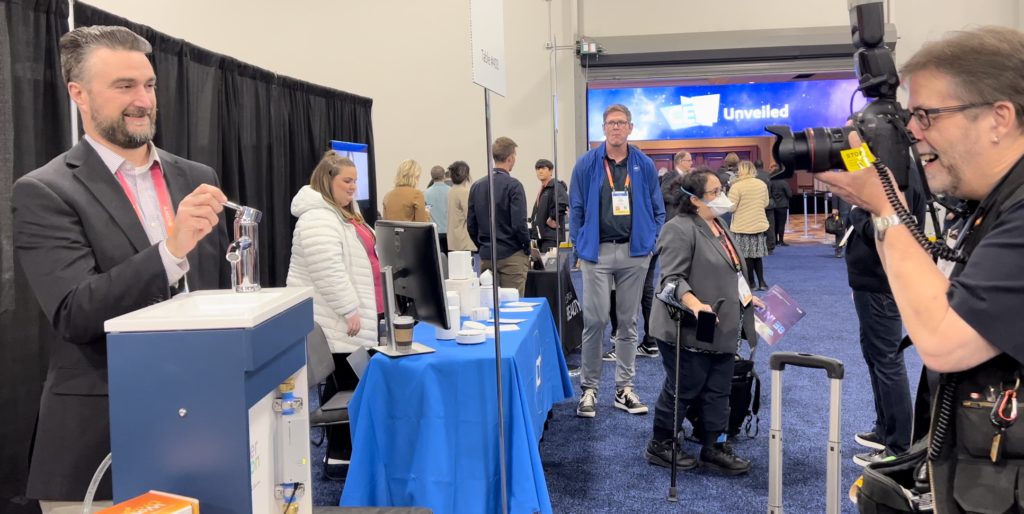The main CES show doesn’t open until tomorrow, but that didn’t stop us from getting a sneak peek at some of the cool new technologies that will be introduced to the general public. Here are some of the new digital health products we already found.
We’ll continue to post about new things we discover and produce some quick YouTube videos on our Skytech Smarthome channel. Let’s get started!
Home Health
NuraLogix Anura
So this one seems like it came directly out of Star Trek. Many times we must visit a doctor simply to get our blood pressure or heart rate or temperature measured so a professional can start to understand what’s happening inside our body. NuraLogix’s Anura app uses the camera you already have on your smart phone to analyze the blood flow within your face in 30 secs to determine your health status using a process known as TOI (Transdermal Optical Imaging). This can provide an incredible amount of information including heart rate, respiration, and (amazingly) blood pressure, mental stress, and even heart attack, stroke and Type 2 Diabetes risk. If this works in the real world, it promises to change the way people care for themselves and their loved ones. We’ll let you know if this non-invasive solution proves to be highly accurate in measuring physiological, mental, and emotional conditions.
WHILL Intelligent Personal Electronic Vehicle
WHILL started in 2010 when a wheelchair user gave up on going to a grocery store just two blocks away. They (among many others) hated the negative attention a wheelchair generated, and WHILL’s founders wanted to change all that. So the WHILL “Intelligent Personal Electronic Vehicle” was born.
Named one of TIME’s Best Inventions of 2018, WHILL is trying reinvent the personal mobility industry by combining state-of-the-art technology with aesthetically pleasing design. I can tell it gathers a lot of attention at the show (didn’t help that the food line snaked right in front of their booth), and it seemed as some semi-autonomous capabilities were emerging.
Circular Ring
The Circular Ring is a competitor to the more well known Oura ring (which is mostly about body temperature), and touts a comprehensive list of information collected, including Blood oxygenation, Heart rate, Temperature, Steps, Respiration, and Sleep. Circular likes to claim that it does not tell you how you are doing but rather it assists you in making good decisions and responding to your body signals in a healthier way. Circular will notify whenever your heart rate gets too high and if your blood oxygenation levels get too low. The base ring costs $229 and ships in May, and unlike Oura doesn’t (yet) require a monthly subscription. We’ll let you know how it works if we get one.
LifeAz Home Defibrillator
Recognizing that most cardiac arrests occur in the home, French company Lifeaz introduced the first defibrillator designed for regular people.
Rather timely, as earlier in the week millions of NFL fans witnessed heroic first responders resuscitate a fallen 24 year-old Buffalo Bills football player Damar Hamlin, using a combination of CPR and defibrillation. The Lifeaz defibrillator is a compact device that can be installed at home or even carried in a backpack. There are more than 350,000 out-of-hospital cardiac arrests annually in the U.S, and 90% are fatal, Apparently, the first 4 minutes are crucial for the brain to survive so a device like this could provide lifesaving features to every home. Lifeaz claims 17 lives have already been saved using their new device.
Valencell Fingertip Blood Pressure Monitor
Valencell introduced what it claims is the world’s first cuffless blood pressure monitor. Blood pressure is notoriously hard to measure without calibrated, cumbersome bands that must be used properly. So it’s interesting to see Valencell, a company that produces sensors for other consumer products like Bose and Jabra, with expertise in photoplethysmography (PPG) introduce something new to the world. The device looks just like a fingertip pulse oximeter, has a tiny screen to show results in under a minute and connects to a smartphone app. They don’t yet have FDA approval (pending) and the product is expected to cost $99.
